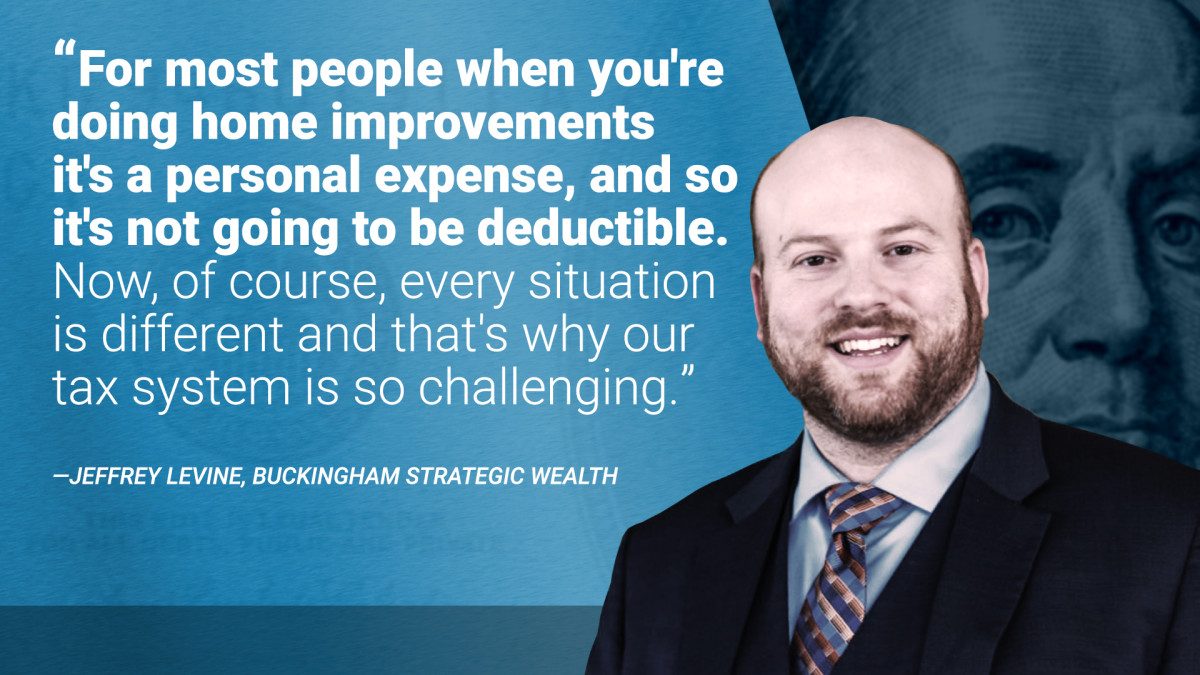The remodeling boom soared in 2021 due to a number of reasons, including the ongoing pandemic and an increasing number of people working from home. Spending and remodeling are expected to remain strong in 2022, with signs that things could slow down by the end of the year, according to Harvard’s Leading Indicator of Remodeling Activity (LIRA)
But, not all home improvements are treated equally by the IRS.
Recommended Reading: TurboTax Advice on Tax-Deductible Home Improvements
“For most people when you’re doing home improvements it’s a personal expense, and so it’s not tax-deductible”, says Jeffrey Levine, CPA and tax expert for Buckingham Strategic Wealth’. But, there are some exceptions.
So, before you grab some paint at Home Depot (HD) or maybe some plants at Loews ( (L) – Get Loews Corporation Report), watch the video above with Levine and Retirement Daily’s Robert Powell for tax tips and home improvement deductions and credits.
Quotes| What Are Some Tax-Deductible Home Improvements? Jeffrey Levine, Chief Planning Officer, Buckingham Strategic Wealth Jeffrey Levine, Chief Planning Officer, Buckingham Strategic WealthOur TurboTax Live experts look out for you. Expert help your way: get help as you go, or hand your taxes off. You can talk live to tax experts online for unlimited answers and advice OR, have a dedicated tax expert do your taxes for you, so you can be confident in your tax return. Enjoy up to an additional $20 off when you get started with TurboTax Live.
More From TurboTax: 8 Ways to Save on Home Improvements
Video Transcript:Robert Powell: Welcome to TheStreet’s tax tips with Jeffrey Levine from Buckingham Wealth Partners. So during Covid, many people were improving their homes, are there any sort of tax planning opportunities for those home improvements?
Jeffrey Levine: You know, for most people when you’re doing home improvements it’s a personal expense and so it’s not going to be deductible. Now, of course, every situation is different and that’s why our tax system is so challenging because everything centers around facts and circumstances.
For instance, most people if you went to put an elevator in your home, right, that would be a nice thing to have, but you don’t need it. But if you, let’s say, we’re in a position where you were dependent, were disabled, and you needed that elevator as a medical expense. Well, then, to the extent that the elevator, the money that you spend on that elevator does not improve the overall value of your property.
So, for instance, let’s say your house is worth $500,000, you spend $50,000 to put an elevator in, and an appraiser comes back afterward and says $510,000. In other words, your $50,000 expense boosted your property value by $10,000 but most people don’t really value an elevator, so it’s not giving it the full 50. Well, that $40,000 becomes a medical expense that could potentially be deductible on your return if it, along with your other medical expenses, exceeds seven and a half percent of your AGI.
There are other things that you do, that may not be deductible, but still provide a tax benefit. For instance, energy-efficient improvements, if you put solar panels on your roof, or you replace your windows or doors with more energy-efficient options, can create credits for you.
And then, finally, if you use your home for, let’s say, a home office, well then it’s not really a deduction for the improvements to your house. It’s a business deduction for your office for your business. But, of course, that could still be part of your home as well. So essentially, not really direct deductions, but kind of there are these satellites orbiting deductions that may apply depending upon an individual specific set of facts and circumstances.
Robert Powell: So I can’t help myself, I have to ask for a follow-up. In many cases, some of these improvements would add to the basis of your house when you go to sell it?
Jeffrey Levine: Of course, yes, if you’re spending money on an improvement. It’s not like we’re deducting this or depreciating it over time if you’re not renting it. So yes, that would add to the cost of your property. Presumably, when you go to sell it, it would have a lower tax bill. Of course, today for primary residents, very few individuals still, even after the recent bull run in the real estate market, very few individuals end up paying income tax on the sale of their house anyway.
Because if you’re single, you can have $250,000 on top of your cost which is tax-free and gain. And if you’re a married couple and you’ve lived there, again, it’s usually you know, you have to in both situations, you have to have two out of five years of living there, and owning the house. But provided you have that for married couples that $250,000 becomes $500,000. So a married couple who bought a house for $500,000 10 years ago and put $100,000 in with a new roof and new kitchen over the last year is at $600,000. They could sell the house for $1.1 million today and walk away without any tax to them.
And actually, Bob, chances are they could sell it for more than that, because things like expenses, like commissions, and other expenses can come off the top of that before you even get there. So most people don’t have a tax bill when they sell their house, but you never know, and if you live there long enough, and the price appreciates enough, it’d be a great problem to have.
Robert Powell: Jeffrey, thanks for those tax tips, and we know that we have some more in store for our viewers in the weeks and months to come.
Jeffrey Levine: Well, I look forward to it and joining you and answering some more reader questions.
